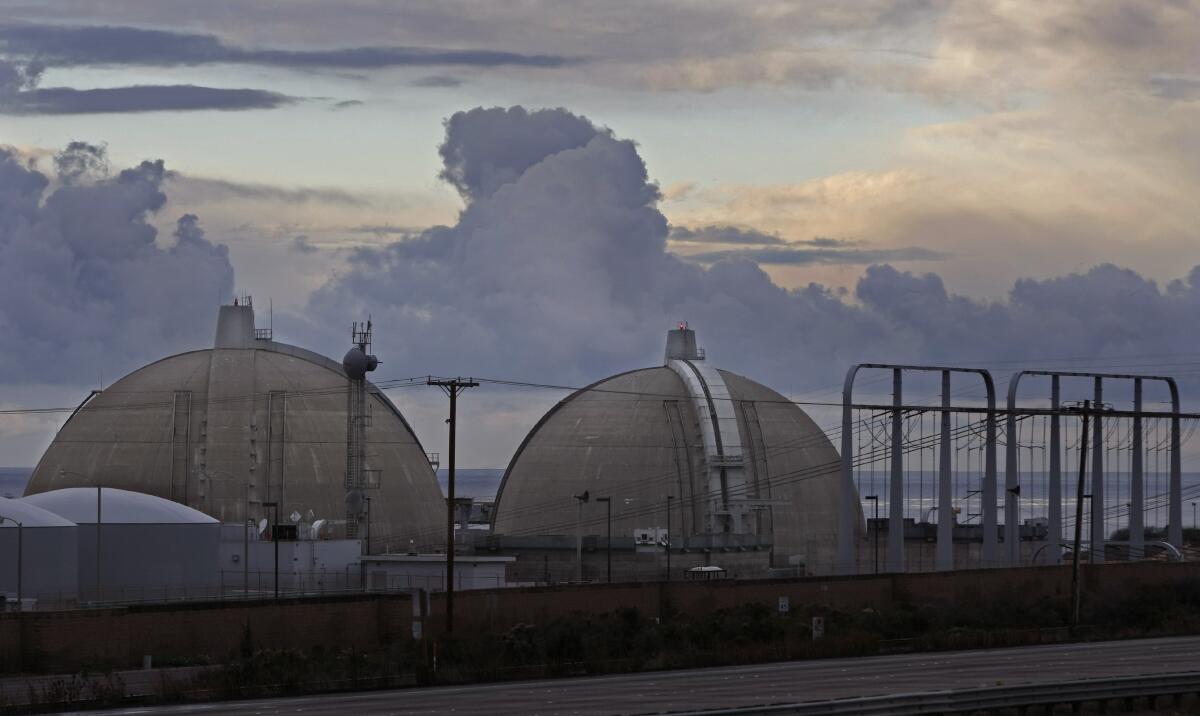Commentary: Urgent action needed to remove spent nuclear fuel for a safer future

- Share via
After decades of failed federal nuclear policy, I commend Department of Energy Secretary Jennifer Granholm and Rep. Mike Levin (CA-49) for their leadership and progress in relocating spent nuclear fuel. As co-chair of the Spent Fuel Solutions Coalition, a member of the San Onofre Nuclear Generating Station (SONGS) Decommissioning Community Engagement Panel, and as the Orange County Supervisor representing communities near SONGS, removing the stranded fuel from our coast is a top priority.
Temporary on-site spent fuel storage, like at SONGS, costs taxpayers approximately $2 million per day, totaling over $9 billion spent to date. Storing spent nuclear fuel on an earthquake fault, vulnerable to sea level rise, along a rail corridor, near a military base, and close to nearly 9 million residents perpetuates past inaction. While the canisters are safe for now, we cannot wait for continued decades of delays.
International case studies and past mistakes offer a clear road map to success. Collaboration from the Department of Energy, congressional leaders and local communities is crucial. Orange and San Diego counties have worked closely together to coordinate emergency services and with SONGS plant owners. My co-chair for the Spent Fuel Solutions coalition is San Diego Supervisor Jim Desmond, highlighting our levels of collaboration.
In June, Secretary Granholm, Rep. Levin and members of the Spent Fuel Solutions coalition announced progress in removing spent nuclear fuel from our coastline. The Department of Energy invested $26 million in grants to engage regions in potentially hosting Consolidated Interim Storage (CIS) facilities. Host communities would receive federal investments in infrastructure and jobs. Community consent is vital, and we modeled community consent-based siting processes from Finland, Sweden and Canada.
To move forward as a nation, we need to take three steps:
Funding. First, reliable funding for federal CIS sites is crucial. These sites will willingly host spent fuel relieving communities unable to store it. DOE’s funding announcement is important, but consistent funding is necessary for steady progress. Inconsistent allocation of financial resources has hindered our spent fuel management program in the past.
Identification of permanent sites. Concurrently, progress toward deep underground geological repositories for permanent disposal is necessary. A permanent repository assures interim host communities they won’t become permanent hosts by default. This requires a change to federal law, allowing exploration of alternatives to the Yucca Mountain facility.
Legislative action. While taking these steps, our coalition plans to lobby for amendments to the Nuclear Waste Policy Act to provide flexibility between CIS and a permanent repository, and the Orange County Board of Supervisors unanimously supported Rep. Levin’s Spent Fuel Prioritization Act. This action by Washington D.C. would expedite CIS while assuring host communities they truly have informed consent.
I urge everyone who wants the removal of spent nuclear fuel from SONGS to raise their voices at the local, state and federal levels. Take action by encouraging your congressional representative to join Rep. Levin’s Bipartisan Spent Nuclear Fuel Solutions Caucus. Request your state assembly members and senators to sign onto Assemblywoman Laurie Davies’ Spent Fuel Solutions letter. Become a supporting member of our coalition through our website. Petition your city councils to join the Spent Fuel Solutions coalition. As always, the public is encouraged to join our SONGS Decommissioning Community Engagement Panel meetings, details of which can be found at songscommunity.com. Act today to secure spent fuel solutions for tomorrow.
Orange County Supervisor Katrina Foley is a co-chair of Spent Fuel Solutions, a group of local governments, elected officials, utilities, environmental groups, labor leaders, Native American leaders, business organizations, and other community members who support the relocation of spent nuclear fuel to a federally licensed facility.
All the latest on Orange County from Orange County.
Get our free TimesOC newsletter.
You may occasionally receive promotional content from the Daily Pilot.





